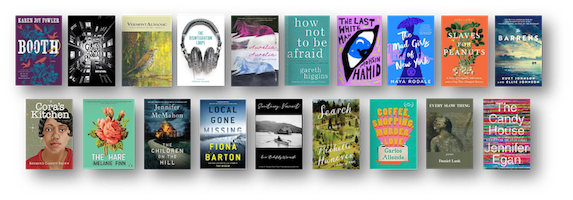Episodes

Tuesday May 31, 2011
Heidi Durrow - Write The Book Interview #144 (5/30/11)
Tuesday May 31, 2011
Tuesday May 31, 2011
Bestselling Novelist Heidi Durrow, Author of The Girl Who Fell From The Sky. This week's Write The Book Prompt was inspired by the work of my guest Heidi Durrow. In the interview, she spoke about the difference between writing short fiction, which tends to find endings and closure, and longer fiction, which needs to open up possibilities that lead into the next part of the novel. This week, write about a character who witnesses something extraordinary. First, write a 500-word story about the situation, in which you offer closure. Then write 500 words that might belong within a longer work of fiction-a chapter that asks questions and opens up the situation for further exploration. Good luck with this exercise and please listen next week for another.

Tuesday May 24, 2011
Cathy Ostlere - Write The Book Interview #143 (5/23/11)
Tuesday May 24, 2011
Tuesday May 24, 2011
Cathy Ostlere, Canadian Author of the memoir Lost and the recent YA novel in verse, Karma. This week's Write The Book Prompt was inspired by the work of my guest Cathy Ostlere, whose new novel, Karma, is written in verse. Look through your creative writing file on the computer or in the bottom of your desk drawer and pull out an idea you've previously shelved, thinking it wouldn't amount to anything. Now look at it anew, and consider what might happen if you were to develop a certain character whose life or situation might be relevant to this idea by working in verse. You can try rhyming verse, or simply play with rhythms. See if something new comes out of that idea simply because you're playing with words in a different way. Good luck with this exercise and please listen next week for another. Music credits: 1) “Dreaming 1″ - John Fink; 2) “Filter” - Dorset Greens (a Vermont band featuring several South Burlington High School students)

Wednesday May 18, 2011
William Lychack - Write The Book Interview #142 (5/16/11)
Wednesday May 18, 2011
Wednesday May 18, 2011
Vermont author of fiction and poetry, William Lychack, whose latest book of short stories is The Architect of Flowers. This week's Write The Book Prompt was suggested by my guest William Lychack. He calls it AN EXPERIMENT IN SYNTAX: THE NEGATIVE INVERSION. Choose a piece of writing that you particularly like or need to think about in some way. Rewrite the piece by copying down the opposite of each word in the excerpt (except, perhaps, for "little words" like articles and prepositions.) Since most words don't have exact opposites, the possibilities are endless, and that's the point. Here's an example that William Lychack provided, inspired by an excerpt from Emerson. Unfortunately, I don't believe I have the legal right to write out the Emerson excerpt here, on my podcast site. You can probably find it online, though. It begins "I dreamed that I floated at will in the great ether," and ends, "I ate the world." [Emerson] Here is William Lychack's Negative Inversion of the quote:
You awoke on the tiny tip of a pin, attached against your will, blind to all but that pinpoint of fire, a vast emptiness beneath these nightmares of a boy. Then a demon took you by the needle and carried you down and said, "Open your mouth." And you opened like a dark void. [Lychack]
Your poem or letter or postcard probably won't make much sense at first, but continue writing your negative inversion until you have your own draft. Work quickly on this first draft, letting your unconscious decide the antonyms. Now put the original away and see what you can make of your draft. Look for a sense of place, character, or subject to develop; cut out what you can't make work; alter details as much as you wish. Good luck with this exercise and please listen next week for another. Music credits: 1) “Dreaming 1″ - John Fink; 2) “Filter” - Dorset Greens (a Vermont band featuring several South Burlington High School students)
Monday May 09, 2011
Sydney Lea - Archive Interview #141 (5/9/11)
Monday May 09, 2011
Monday May 09, 2011
Interview with author of poetry and prose Sydney Lea. Hosted by Shelagh C. Shapiro, Write The Book airs on WOMM-LP 105.9 FM “The Radiator,” in Burlington, Vermont, every Saturday morning at 9:00 a.m. - a new time for the new hour-long format.
Prompt: Today’s Write The Book Prompt concerns setting. How can a writer describe setting in such a way that it informs readers about a character’s or narrator’s state of mind? Consider the following two excerpts from works by Sydney Lea:
From his essay, “Alone With Friends: A Journal Toward Springtime”
… Landy and I sat for a spell on the tailgate, staring at the clean dark that walked at a human pace up the mountains, feeling a flake or two of snow on our wrists and faces, noting a heron who came languidly flapping out of a back pond, roost-bound early.
From his poem, “The Author in March”
Remnant, rank corn snow
. perspires like dirty dough.
What few drab birds there are
. don’t fly up very far,
So hard do the clouds bear down.
. Not much to this splotch of a town—
Flue smoke, smalltalk, clutter.
. Last autumn’s leaves clog gutters
Here’s this week’s prompt. Imagine a place in a poem or story you’re writing or are thinking about writing. Using minimal description, make a list of several things—five or six details—that exist in that setting. Now rewrite the list, describing those same details as seen from the perspective of a character who is upset, frustrated or depressed. Then write the list one last time, describing these same things from the point of view of a character who is happy, optimistic or excited. Don’t change the actual details of place, but the lens through which they are viewed. Good luck with this exercise and please listen next week for another.
Music credits: 1) “Dreaming 1″ - John Fink; 2) “Filter” - Dorset Greens (a Vermont band featuring several South Burlington High School students)
Wednesday May 04, 2011
Abby Frucht - Archive Interview #140 (5/2/11)
Wednesday May 04, 2011
Wednesday May 04, 2011
A Rerun of a January 2009 WTB interview with Abby Frucht, former Iowa Short Fiction award winner and writer of short stories, novels, essays and reviews. Today's Write The Book Prompt was inspired by this week's interview with Abby Frucht. In discussing her work, Abby explained that, to her, specific detail achieves two purposes. First, "it allows the reader to have an immediate physical investment in the story." And second, it can have larger significance, serving a figurative function in the narrative and acting as a signpost for the reader. In the case of her story, "The Dead Car," the detailed description of the spoon that was lost may later be brought back to remind the reader that this spoon speaks to loss, generally. Not just the loss of a certain object, but other kinds of loss, as well. In your own work, study the descriptions that already exist and see if you can use specific detail to your advantage, not simply to embellish, but to help readers experience the work more fully. Try to find objects that already exist in the work, then heighten their function through detail. Avoid wedging in symbols; try to allow significant details to arise organically. Good luck with this exercise and please listen next week for another.

Wednesday May 04, 2011
Linda Bland - Archive Interview #139 (4/25/11)
Wednesday May 04, 2011
Wednesday May 04, 2011
A Rerun of a December 2008 WTB interview with Linda Bland, owner of Cahoots Writing Services in Cambridge, Vermont. Today's Write The Book Prompt is inspired in part by the interview you heard today. Linda Bland mentioned that she needs to exercise before attacking a manuscript, either her own or one that she's reading for a client. With this in mind, today's prompt is this: if you're feeling stuck or need an idea before getting started with your writing today, go for a walk. Or, if you prefer, a run or a swim. Put on snowshoes or cross country skies, if the snow is too deep for walking. Before striking out, set yourself an assignment. Tell yourself you need an idea, or you need to develop that idea you had last week. If a particular scene or snippet of dialogue is giving you trouble, suggest to yourself that during the next hour of exercise, you'd really like to work out this problem. Write down what you are hoping to accomplish, then go exercise. Don't actively focus on the problem you've set yourself, just let it be there, within your awareness, as you walk or hike or bike. When you get back, write for at least half an hour and see if you've made progress. Good luck with this exercise and please listen next week for another. Music credits: 1) “Dreaming 1″ - John Fink; 2) “Filter” - Dorset Greens (a Vermont band featuring several South Burlington High School students).

